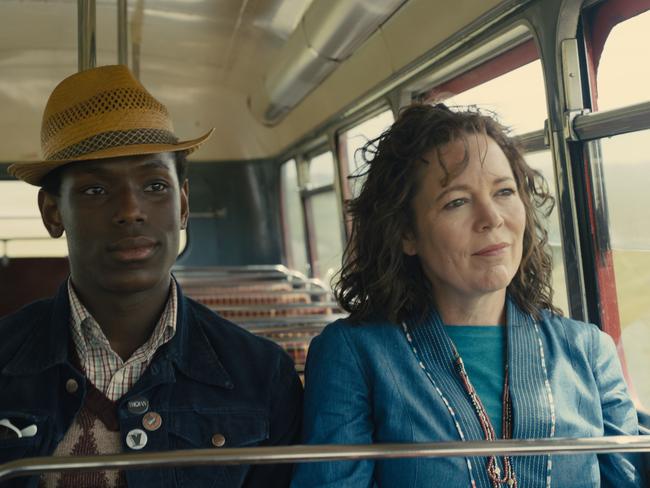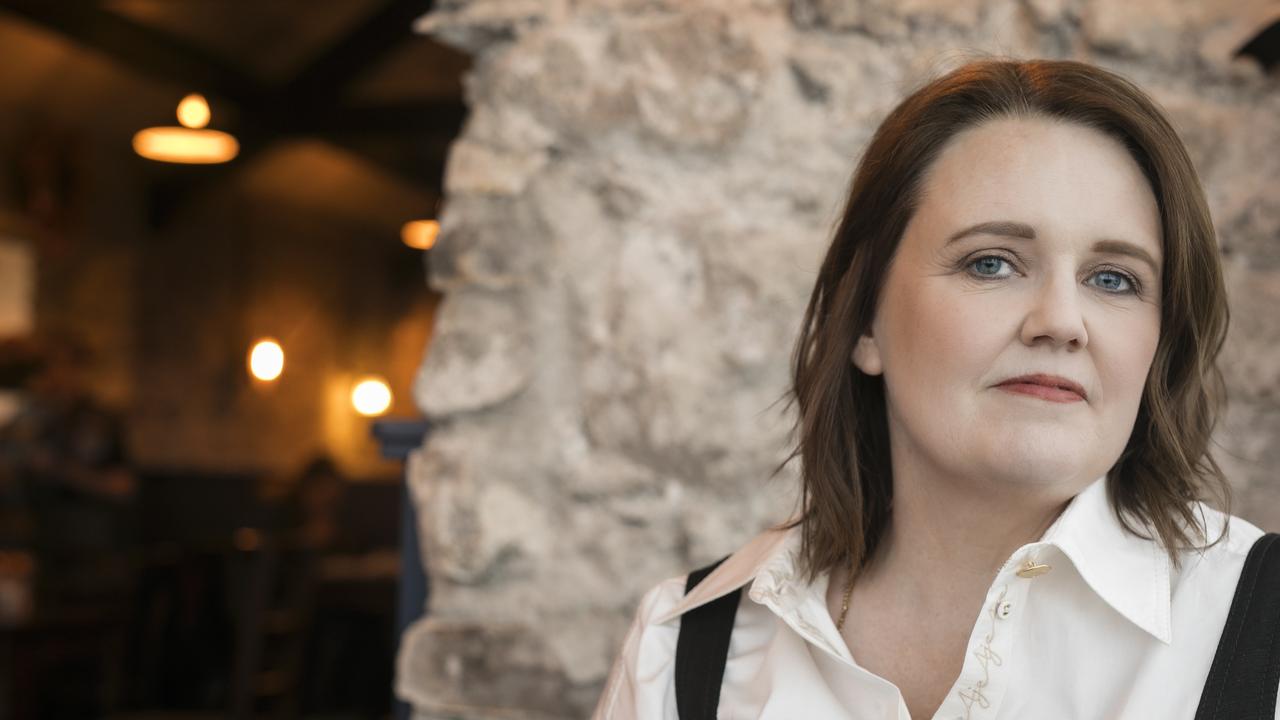Olivia Colman’s lonely cinema manager shows her strength
Sam Mendes’s handsomely filmed Empire of Light pays tribute to the magic of movies and finding connection in unexpected places.

Empire of Light (MA15+)
In cinemas
★★★★
It’s Christmas Day, 1980, in the southern English coastal town of Margate, and Hilary (Olivia Colman) is all alone; on her dining table is a single Christmas cracker, but Hilary has no one to help her pull it. Hilary works as the duty manager at the venerable Empire cinema, an art deco picture palace that still boasts red curtains that part as the lights dim and the movie commences.
The writer-director of Empire of Light, Sam Mendes, is clearly in love with the building that gives the film its title, and he and his ace cinematographer, Roger Deakins, photograph the old cinema with something like awe: the large foyer with its box office and candy bar; the red carpeted stairs leading up to the circle; the auditorium itself and, especially, the projection booth where Norman (Toby Jones) is in complete control and where, in one beautiful scene, he explains how static images come to life. The upper floor once boasted a ballroom, but it’s now unused, though a grand piano is still in place. Pigeons have taken over this part of the Empire.
The cinema is owned by Mr Ellis (Colin Firth in an unsympathetic role for once), a married man who insists that Hilary visit him in his office on regular occasions for quick and furtive sex. The other employees include Neil (Tom Brooke) and Janine (Hannah Onslow). They’re joined by a new staff member, Stephen (Michael Ward), who is black and who lives with his mother (Tanya Moodie); Stephen yearns to go to university to study architecture.
Margaret Thatcher has been prime minister for a year and a half, and Britain is reeling from the Brixton race riots and the racist violence of the skinheads belonging to the National Front. But Hilary who, we learn, has recently spent time in hospital and is taking the drug lithium for her mental problems, is attracted to the young, handsome Stephen who is surprised to learn that though she works in a cinema she never sees a film – at a time when movies like All that Jazz, Raging Bull and Stir Crazy are being screened. The pair become close – Stephen is also lonely. At midnight on New Year’s Eve, on the roof of the Empire with fireworks bursting in the background, she spontaneously kisses him. Thus begins another secret liaison that will climax on the night the Empire screens the south coast premiere of Chariots of Fire to a guest list that includes Laurence Olivier, Dusty Springfield and Paul McCartney (not that we see any of them).
Colman, who has never given a bad performance, surpasses herself as this troubled, conflicted woman, while Ward lends impeccable support. The film’s themes – violent racism, loneliness, alienation – are expertly integrated in Mendes’s screenplay into a valentine to the old-fashioned cinemas where so many of my generation discovered the magic of the movies. The main location for the film was a real cinema that had fallen into disrepair and was restored to its former magnificence. It provides a vital centre for this poignant, intelligent, handsome film.
-
Aftersun (M)
In cinemas
★★★
The Oscars for 2023 will be announced on March 13, Australian time, and one of the most discussed aspects of this year’s event involves the acting nominations. Two actors have been nominated for very small films, films so modest that they would normally not have been seen by enough Academy members to earn sufficient votes. Andrea Riseborough has been giving excellent performances in films for several years now and she is certainly memorable in To Leslie, which releases in Australia on March 3. Paul Mescal, who is nominated for Aftersun, is not nearly as well known.

Aftersun, written and directed by Scottish filmmaker Charlotte Wells – her first feature after making a couple of well-regarded short films – is, on the surface, a very simple affair. In the early 2000s, Calum (Mescal), a Scottish man about to turn 31, takes his 11-year-old daughter, Sophie (Frankie Corio), for a summer holiday at a beachside resort on the Turkish coast. Sometimes taken for brother and sister, father and daughter enjoy their time in the sun even though the place where they’re staying is rather basic. Sophie, a very bright, observant girl, records their holiday on her video camera while also observing with interest the older children staying at the resort, teenagers who are exploring their sexuality.
Meanwhile, father and daughter swim, sunbake, play snooker, and observe the passing parade. Sophie is on the cusp of puberty and she even gets her first kiss during the holiday. But Calum clearly has problems. The film isn’t at all explicit about what ails him, but Wells drops clues from time to time. It seems clear that Calum is separated from Sophie’s mother and that Sophie doesn’t live with him, so this holiday represents a rare opportunity for father-daughter bonding. In one unexpected scene we see Calum alone in his hotel room weeping uncontrollably; we don’t know the cause of his grief but, like Sophie, we can only guess why he’s depressed. Whatever is consuming him, he tries to make a brave face of things for his daughter’s sake. Nevertheless, he confides to a swimming instructor that he doubts that he will reach the age of 40.
The film is minimalist in its approach. Among the most important scenes are one in which Calum considers purchasing a Turkish rug which is really too expensive for him. In another key scene, Sophie tries in vain to persuade her dad to take part in a karaoke evening – she has no qualms about participating herself and performs Losing My Religion with assured self-confidence.
Not all of the film takes place during this brief summer vacation. Some 20 years later the adult Sophie (Celia Rowlson-Hall), now about the same age that Calum was when they shared that precious time together, looks back on the holiday, revisiting the grainy video images.
Aftersun has been enthusiastically reviewed, especially in the UK, where it topped the charts of some critics as the best film of 2022.
I can’t share this extravagant praise. The film is immensely likeable, well acted, touching and a little troubling, but to overpraise such a modest production is to do it no favours.
Good as he is, I’m not sure that Mescal’s performance is one of the five best examples of male acting in feature films during past year. And while Wells demonstrates a delicate and apparently very personal talent – she has said in interviews that her film is emotionally autobiographical – she will in the future, I hope, move on to more substantial material than this wafer-thin story.




To join the conversation, please log in. Don't have an account? Register
Join the conversation, you are commenting as Logout